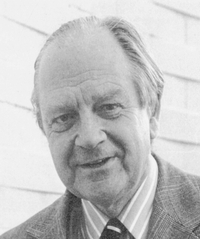Richard Clutterbuck
(academic, spook) | |
|---|---|
 | |
| Born | 22 November 1917 |
| Died | 6 January 1998 (Age 80) |
| Nationality | UK |
| Interests | • “terrorism” • counter-insurgency |
Military academic equaling political dissent with political violence, and political violence with terrorism. | |
Major General Richard Clutterbuck was a British counterinsurgency and counterterrorism academic also connected to several semi-private military contractors.
Contents
Career
Clutterbuck was commissioned into the Royal Engineers in 1937 after graduating in mechanical sciences from Pembroke College, Cambridge. After Dunkirk, he went through both the Western Desert and Italian campaigns.
The army sent Clutterbuck to different hotspots, including Palestine (1947) during the Irgun Zvei Leumi's terrorist campaign. In 1956, up against Chinese communists[where?], Clutterbuck shed his rank badges to go on patrol as an ordinary soldier. As chief engineer Far East, 1966–68, Brigadier Clutterbuck put into practice in northeast Thailand the counter-terrorist philosophy he was gradually evolving. His next job after Thailand was as Engineer-in-Chief (1968–70) at the Ministry of Defence. While in the Far East he had started to read for a PhD in politics. In 1968, he enrolled at the University of London.
Control Risks
Clutterbuck, a media staple in Great Britain and the author of several books on terrorism, including Living With Terrorism (1975) and The Media and Political Violence (1981), is a staunch proponent of the counterinsurgency doctrines developed by Frank Kitson. He argues in the latter study that "violence in industrial disputes, violence in political demonstrations, and terrorism" are all of a type. Following Kitson and the pattern established in his 1973 book, Protest and the Urban Guerrilla, Clutterbuck effectively conflates political dissent with political violence, and political violence with terrorism. That is, like many rightists, Clutterbuck seeks to criminalize dissent by labeling it terrorism.
In 1986, Clutterbuck put his expertise to use as an associate of Control Risks Ltd. by spying on British animal rights groups for the chemical industry. Several leading chemical and food manufacturers had commissioned the Control Risks study in 1984 in response to heavy antivivisectionist lobbying. According to Kevin Toolis of the London Observer, Clutterbuck interviewed several leaders of the animal rights movement, claiming that he was writing a book. He neglected to mention that his "book" was, in actuality, a report underwritten by the chemical industry and that he was a director of Control Risks.[1]
See also
- Janusian Security Risk Management
- Document:The Security Industry extract from The "Terrorism" Industry
- Institute for the Study of Conflict